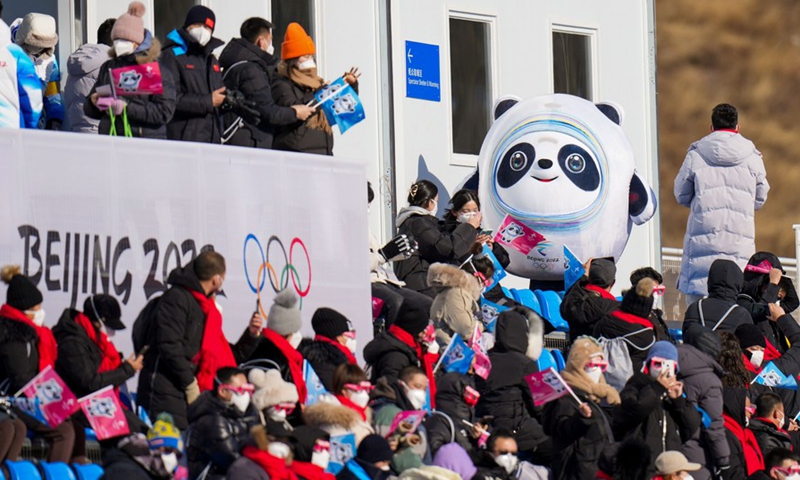
Bing Dwen Dwen, the mascot of Beijing 2022 Olympic Winter Games, reacts to the audience during the Cross-Country Skiing Men's 15km + 15km Skiathlon at National Cross-Country Skiing Centre in Zhangjiakou, north China's Hebei Province, February 6, 2022. Photo: Xinhua
The Beijing Organising Committee for the 2022 Olympic and Paralympic Winter Games announced during a press conference on Tuesday that the overall situation of epidemic prevention and control in the closed loop is in good status and the next step will be to increase attendance according to demand.
Brian McCloskey, Chief Medical Expert of the Beijing Winter Olympic Games, said at the conference that the global spread of Omicron is continuing and the closed-loop management adopted by Beijing 2022 will make it safer for athletes to compete.
"The situation inside the closed loop is safe and there is no sign of virus transmission, which can be said to have met our expectations," said McCloskey, noting that "the closed-loop is based on science and will not let down our guard against the virus."
Huang Chun, Deputy Director of the Epidemic Prevention and Control Office of the Beijing 2022, said at the conference that all spectators are kept outside the closed loop and health monitoring and nucleic acid testing are required before the games
"Spectators have access to the stadium through separate entrances and exits to the stands," the official explained, adding that "after returning to their place of residence, they should undergo a week of health monitoring and two nucleic acid tests to ensure that they do not carry the virus after watching the games and ensure the safety of the masses.
Huang stressed that health monitoring is not the same as quarantine and people can go to work as usual. However, Huang advised them not participate in gathering activities and take nucleic acid tests on time as required.
The organizing committee announced on January 17 that it decided to
suspend ticket sales to the public for the Beijing Winter Olympics to ensure the health and safety of those involved in the Games and, instead, a designated audience will be selected for the competitions.
The selection of the audience at competition venues is also a response to the emergence of the more infectious Omicron variant in Beijing, three weeks before the Winter Olympics began.
"The audience is not the same group of people but chosen according to their interest in watching the games," Huang added. Given that the situation is under control, the next step will be to increase attendance based on demand.




